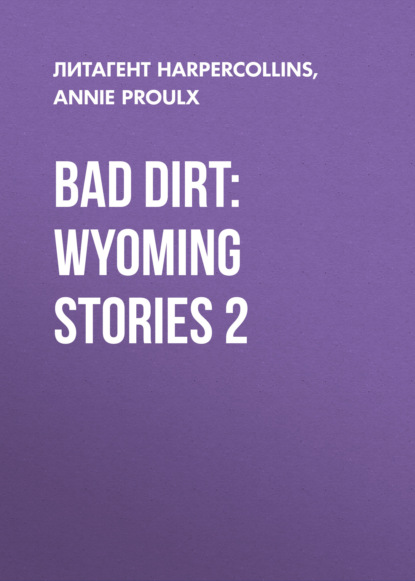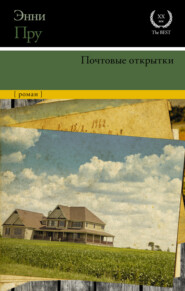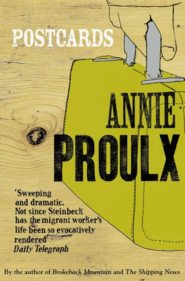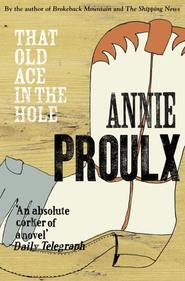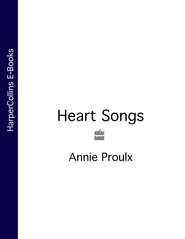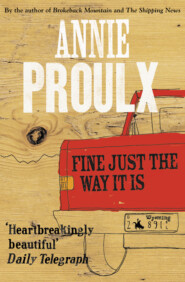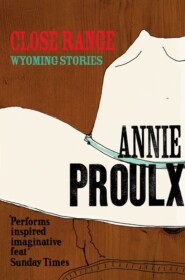По всем вопросам обращайтесь на: info@litportal.ru
(©) 2003-2024.
✖
Bad Dirt: Wyoming Stories 2
Автор
Год написания книги
2019
Настройки чтения
Размер шрифта
Высота строк
Поля
Deb’s only asset was his flatbed truck. Most of what little money he made with occasional hauling funneled straight into Elk Tooth’s three bars, what bartender Amanda Gribb called the Wyoming trickle down effect. He would run up a big tab at the Pee Wee, and when Amanda leaned on him he switched to the Silvertip and the Pee Wee saw him not. When the Silvertip debt began to be mentioned he favored Muddy’s Hole and dropped hints that he was looking for a job or two. Everyone understood that he wasn’t interested in a real job but in a few days’ work. Sooner or later something came up, and when he collected he’d hit the Pee Wee, pay off his tab, and start a new one. So went the cycle of Deb Sipple’s years measured in bar bills and small work.
Wyoming had been dry as a quart of sand for three years and Elk Tooth was in the heart of the drought disaster zone. Those ranchers who had held on to their herds hoping for rain were caught like mice. As the summer drew to its stove-lid end, the most precious commodity to those in the cow business was hay, and the prices demanded for it matched the prices for rubies. Ranchers spent hours on the telephone and searching the Internet for reasonably priced hay. No flimsy or wild rumor could be ignored. If a rancher heard of hay up in Saskatchewan that a seller described simply as “not moldy” she’d try for it.
Most of the desperate ranchers were women, for in Elk Tooth lady ranchers abound, some who had stepped into ownership when a husband rancher died, some the mature daughters of men who had sired no male heirs, some ex-CEOs who had tossed up everything and headed for the high country, as close to Jackson as they could get.
One of the ranchers was Fiesta Punch, a good horsewoman, but rough on the hired help. She ran Red Cheerios, a weird brand of exotics with white rings around their eyes her grandfather had bred up, but this summer their range was so badly gnawed it resembled the surface of an antique billiard table in an attic heavily populated by moths. There was no point in selling. The market was glutted and prices lower than breakeven. And she wanted to hold on to what was probably the only herd of Red Cheerios in existence. She had to get her hands on enough hay to carry them through the fall and winter. She owed that much to family heritage.
The double trouble with scarce hay was that in addition to paying through the nose for the stuff, when she finally located some, she would have to face fearsome transport charges. The only decent hay grew in distant parts, and hay transporters knew a penned turkey when they saw one. Hauling the hay from Farmer X to Rancher Z could double the cost of the precious bales. Fiesta Punch was in a position to lose her shirt. On the other pan of the scale Deb Sipple, with his big flatbed truck, could almost guarantee himself several years of elbow security at the Pee Wee.
Ms. Punch was hunched over her account books one night alternately adding figures and cracking her knuckles when the phone rang.
“Fiesta?”
“Yes.”
“You don’t know me but this is the friend of a friend.”
“Friend of a friend?” She could hear country and western music—Dwight Yoakam’s rock-drill voice—in the background. “What is it? You want to talk about urban legends?”
“What?”
“Never mind. What can I do for you? I’m kind a busy.”
“I know where you can git you some hay. Good hay.”
“Where might that be? Shangsi Province? The Upper Volta region?”
“No, just up there in Westconston. I got a friend in Cooke City and his cousin Björn got hay. It’s not so drouthy up there.”
“Two or three bales, right?”
“Wrong. He got eighty bales. Them big round ones, them thousand-pound ones you need a bale fork to lift.”
“Let me see if I got this straight. Your friend is in Cooke City, Montana, and his cousin with the hay is in Wisconsin.”
“Uh-huh.”
“What kind a money does he want for it?” Wisconsin hay was expensive.
The caller named a ridiculously low figure, seventy dollars a ton, the cost of hay three years earlier.
“Must be full a weeds and thistles.”
“It’s good hay. You can drive up there, look at it. But you better be fast, he won’t have it long. So far you’re the only one knows about it.” He gave her Björn’s phone number in Disk, Wisconsin.
“So how come I’m the lucky rancher gets to hear about this great hay?” she said, but her question fell on a dead connection.
She flew up to La Crosse, rented the airport’s last available car, and drove out to Disk. Björn Smith was a thready blond in his forties with a round head and beaky orange nose that gave him the look of a seagull. He showed her the hay, stowed in a capacious, fragrant barn. It was prime alfalfa hay, holding green. She pulled out a handful and looked at it—there was a high proportion of leaf to stem, it was pliable and clean. She noticed it had been cut when in the bud stage. There was nothing like Wisconsin alfalfa hay.
“First cutting?” she asked.
Björn nodded. “I could a sold it at the hay auction for more but Deb said you was a friend and needed hay bad. I guess you got a mean drought over there in Wyoming?”
She twisted her mouth in sardonic agreement, paid him on the spot. There goes almost six grand, she thought.
“I’ll get Deb come pick it up soon’s I can,” she said, folding the bill of sale into her wallet.
“Sooner the better. I want a get out a here.”
“Givin up farmin?”
“Yeah. Goin a film school at UCLA.”
“No kiddin. Like learnin how to make movies?”
“That’s right. I got ideas.”
“Oh,” said Fiesta Punch, “we all got them.” Then, more kindly, “I hope you make it.”
Deb Sipple was in Muddy’s Hole cutting the dust with his eleventh beer and seventh cigarette when Fiesta Punch came through the door and looked around, headed for him as if following a chalk line drawn across the floor.
“Hello, Deb. That’s a filthy habit. Everbody else but you give up smokin. Anyways, I bought some hay up in Wisconsin and I want you to go pick it up as soon as possible. Tomorrow.”
“Westconston! Hell, that’s halfway across the country. That’s the other side a the Mississippi. It’s almost in New York.”
“Not quite. It’s in Disk, just over the Iowa line. As I think you know, so don’t play dumb.” She knew who the anonymous caller had been. “Speed is necessary. Your pal Björn wants to split and I need the hay. It’s a couple trips for you.”
He put on a sly face. “You know I’m goin a bite your red rosy ass with a heavy price.”
“That’s what I come to discuss.”
“I got to ask two dollars fifty a ton.”
“I’ll take it!” She could hardly believe her ears. She had been expecting to hear twenty or thirty dollars per ton.
Вы ознакомились с фрагментом книги.
Приобретайте полный текст книги у нашего партнера:
Приобретайте полный текст книги у нашего партнера:





